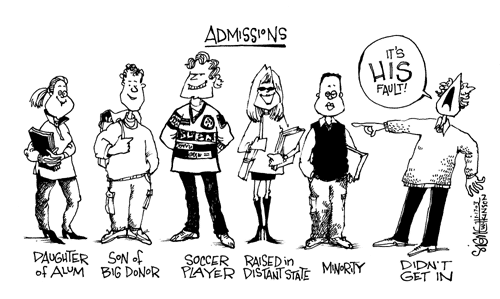
I only managed to watch a small portion of Sonia Sotomayor's confirmation hearings on television. The part I saw was the speech by one of the New Haven firefighters who feels unjustly persecuted on racial grounds by Judge Sotomayor. I have to confess that it was pretty surreal to see a young white male more or less accuse a Latin woman of racism. The firefighter (whose name I unfortunately failed to catch) was on the verge of tears when he talked about being racially discriminated in America.
Today, I saw a replay of the same attitude by yet another white male. This time, it was a
New York Times journalist Ross Douthat who decided that somehow his perspective on racism is valuable enough to be shared with thousands of readers. In his article "
Race in 2028," Douthat takes on the issue of affirmative action. Of course, no white person who is against the affirmative action will ever honestly tell you what
really bothers them about the concept. The arguments against affirmative action always follow the same scenario. "
Of course, I hate racism," says the white person (who now, at least in some cases, thankfully omits to say that some of his closest friends are... you know). "
But we have to keep in mind," the white person in question immediately adds, "
that there are inherent dangers that always accompany this practice."
The ingeniousness of these imaginary "dangers" ranges from simply bizarre to outright freaky. Douthat's justification for his dislike of affirmative action, Sonia Sotomayor and Barack Hussein Obama (don't the conservatives just love the president's middle name) is corruption. "A system designed to ensure the advancement of minorities will tend toward corruption if it persists for generations, even after the minorities have become a majority," he says and later continues: "But if affirmative action persists far into the American future, that experiment will have failed — and we will all have been corrupted by it." Of course, there is no explanation of how he manages to connect affirmative action and corruption except a hint towards "the backroom dealing revealed by Ricci v. DeStefano, where the original decision to deny promotions to white firefighters was heavily influenced by a local African-American “kingmaker” with a direct line to New Haven’s mayor." For anybody who has lived in New Haven (as I did for several years) the idea of some kind of African-American mafia that influences the mayor and corrupts court proceedings in that city sounds outlandish.
Racism in New Haven is palpable. It's something you live and breathe every single day. That's why it was so shocking to see the white firefighter who somehow managed to dissociate his speech at the confirmation hearings from the everyday reality he experiences in his town. I look at people like the firefighter and Douthat and I wonder how it is even possible for them to avoid the simple realization that absolutely everything they have, do, and experience is the result of centuries of racial discrimination in America.
Affirmative action must come "with a statute of limitations" claims Douthat. It needs to be "phased out" very soon or the white folks will start to get upset and it will turn into "a source of permanent grievance among America’s shrinking white population." It's curious to observe that Douthat honestly believes that it's the white population who has a cause for "permanent grievance." Note the weird, convoluted logic here. Centuries of slavery and segregation only deserve a couple of years of redress. The existence of affirmative action for several decades, however, will justifiably provoke a permanent sense of grievance on the part of folks like Douthat.
Another thing that bothers me in the discussion about affirmative action is this idea that affirmative action is something that racial minorites need and we, the kindly white people, give to them out of sheer niceness. Albeit in different ways, racism hurts every one. It's not the problem of African-Americans or Hispanics. It's the problem of the entire society. It's not a question of what "we" do for "them". It's a question of what all of us should do for ourselves, our society.
I'm very much in favor of affirmative action for my university. I want African-American, Asian, Hispanic, and Native American students in my class. But not because I'm so nice and kind and want to do something good for them. As a teacher, I need these students desperately. I need their contribution, their perspective, their knowledge, their presence, and their talent. I hate Douthat and Co's attempts to coopt my voice as a representative of the "shrinking and permanently aggrieved white population." Racism is what permanently aggrieves me, not affirmative action.

